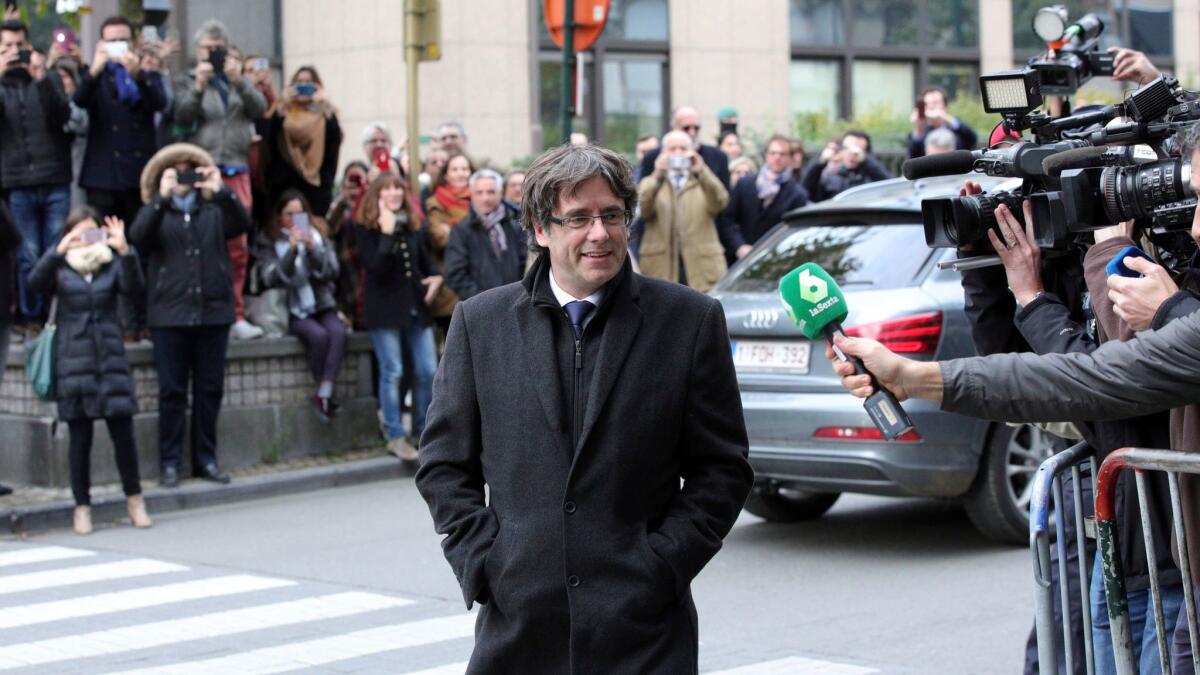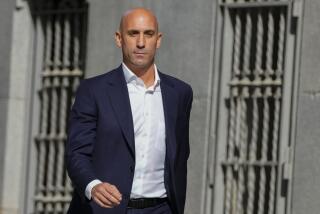Catalan leader vows not to return to Spain unless he can be guaranteed a fair trial

Catalan leader Carles Puigdemont insisted that he remains the Spanish region’s president and will not return to Spain until he is guaranteed a fair trial.
Puigdemont spoke at a packed Brussels news conference across the street from European Union institutions. His arrival in Brussels on Monday with other Catalan politicians sparked speculation about his plans in Belgium.
The Catalan leader said he will return immediately to Spain if he is guaranteed a fair trial there.
A Spanish judge on Tuesday summoned Puigdemont and five members of his former Cabinet to appear this week in Madrid as part of a rebellion inquiry for pushing ahead with an independence declaration in Catalonia.
Spain’s chief prosecutor is seeking charges of rebellion, sedition and embezzlement against Puigdemont, former VicePresident Oriol Junqueras and a dozen members of their ousted government. The crimes are punishable up to 30 years in prison.
Investigating judge Carmen Lamela said the group should appear in the National Court on Thursday for interrogations that would last through Friday.
The Constitutional Court in Madrid separately announced Tuesday that it was suspending the Catalan parliament’s independence vote while it studies its legality.
One of the main separatist civil groups of Catalonia, the National Catalan Assembly, said Tuesday it accepted the regional election, despite the fact it was considered illegal by the Spanish government. It said grass-roots organizations need to prepare a “joint strategy” ahead of the elections with the goal of “obtaining an uncontested victory that will ratify the Republic.”
Some of the Catalan government’s websites were down Tuesday as central authorities moved to take over.
“We want to denounce the politicization of the Spanish justice, its lack of impartiality, its pursuing of ideas, not crimes, and to explain to the world the serious democratic deficiencies the Spanish state has,” Puigdemont said.
He insisted that he will remain the legitimate president of Catalonia, and did not specify how long he intends to stay in Brussels. “It depends on the circumstances,” Puigdemont said.
More than 90% of Catalans who participated in an Oct. 1 referendum voted for the region to become independent. However, only 42% of eligible voters participated in the balloting.
Spanish Prime Minister Mariano Rajoy fired Puigdemont and other Catalan leaders Friday after the regional parliament declared independence from Spain. Rajoy also called for a snap election to be held on Dec. 21.
Puigdemont told journalists he will accept the outcome of that election.
He also said that he and the other politicians who face charges “will not avoid the judiciary citations and that we will face politically this severe injustice raised by the Spanish government.”
His lawyer Paul Bekaert told Reuters before the news conference that Puigdemont was considering applying for political asylum in Belgium.
But Puigdemont said he will not seek asylum and insisted that he fled “not to Belgium, but Brussels. It’s important to say that because it’s the capital of Europe.”
Bekaert is a human rights lawyer who defended Basque terrorism suspects in the 1990s and in 2013 successfully fought the extradition of a Basque suspect from Belgium to Spained Basque terrorist.
On Saturday, Belgium’s secretary of state for asylum and migration, Theo Francken, fueled speculation Puigdemont could apply for asylum. Francken is a member of the N-VA, a nationalist party that has advocated for the independence of Belgium’s Dutch-speaking Flanders region. Puigdemont dismissed rumors that he has had contact with the N-VA since he arrived in Belgium.
But his arrival has created an uncomfortable situation for Belgian Prime Minister Charles Michel, whose centrist, free-market-oriented party governs in a power-sharing coalition with the N-VA.
“The same rights and duties as any European citizen for Mr. Puigdemont, not more or less,” Michel said on Twitter after Puigdemont’s news conference.
Several leaders from other EU countries came to Rajoy’s defense this month and vowed to back him in the conflict over Catalonia’s status. Michel was among those who did not publicly reject the Catalan parliament’s declaration of independence last week.
After the news conference, Puigdemont was escorted through hundreds of journalists and protesters and left the area in a taxicab.
Most demonstrators outside the building where Puigdemont spoke waved Spanish and European Union flags. A small group waved Catalan flags.
Dimitri Hoegaerts, who held a Catalan flag, said he is Flemish and wants his region to secede from Belgium.
“We don’t hope anything from the European Union because they look the other way,” Hoegaerts said. “I hope that my country, Belgium, will recognize the legitimate government of Mr. Puigdemont.”
Nearby, Roberto Veira, a native of La Coruña, Spain, waved an EU flag.
“This nationalism is based on propaganda, based on hate, hating Spaniards. It’s based on lies,” Veira said.
“It’s about defending the rule of law. We know we have a good reason to defend our country.”
Outside the Catalan government building in Barcelona’s Placa de Sant Jaume on Tuesday, a few independentista protesters hoisted Catalan flags and banged drums. But the crowd of recent days had dispersed. Tourists mingled with residents who said they were eager to get back to their routines.
On a corner of the square, Tony Bialta and his construction crew were installing windows, and he paused to explain why he was frustrated with Puigdemont.
Bialta, 40, opposed independence in thelection referendum, which he considered illegal, and wants Puigdemont and his associates to return so they can be held accountable.
“He needs to come back here to his work, to face all the politicians in the Senate,” Bialta said.
Standing nearby, train mechanic Arturo Perez agreed.
“He needs to be in Barcelona. He did things and he needs to come back to face the courts,” said Perez, 33, adding that he considered the referendum illegal.
Friend Esther Andres, 31, said she hopes European powers that have so far sided with Spain can now mediate.
“We need to find a solution,” she said. “This is the time when we can have someone intervene.”
A few streets away in the busy university area, cashier Pepi Escriba said the situation has become ridiculous.
“He needs to come back and tell us to our face what happened. If you break the law, what you do has no value,” she said, adding that she hopes protests stop. “People want to live in peace.”
“There’s more people against than for independence,” Escriba, 47, insisted. “If they have the vote Dec. 21, we’ll see.”
Local government worker Nuria Carre, who voted for independence and was out in the streets celebrating last week, was back in her office Tuesday. She wasn’t sure what to think about Puigdemont fleeing to Belgium, but she understood why he left.
“He’s facing 30 years. It’s barbarity because he didn’t do anything. This penalty is for rebellion, but there wasn’t any rebellion. There were protests and elections,” she said.
molly.hennessy-fiske@latimes.com
Twitter: @mollyhf
Hennessy-Fiske reported from Barcelona. Times special correspondent Stupp reported from Brussels.
ALSO
Catalan separatist leader calls for peaceful resistance to Spain takeover
Spain’s government seeks rebellion and sedition charges against Catalonia’s leaders
In Paris falafel war, it’s neighbor vs. neighbor in the city’s changing Jewish quarter
UPDATES:
12:45 p.m.: This article was updated throughout with Times reporting that includes reaction from people in Barcelona.
This article was originally published at 7:05 a.m.
More to Read
Start your day right
Sign up for Essential California for news, features and recommendations from the L.A. Times and beyond in your inbox six days a week.
You may occasionally receive promotional content from the Los Angeles Times.







